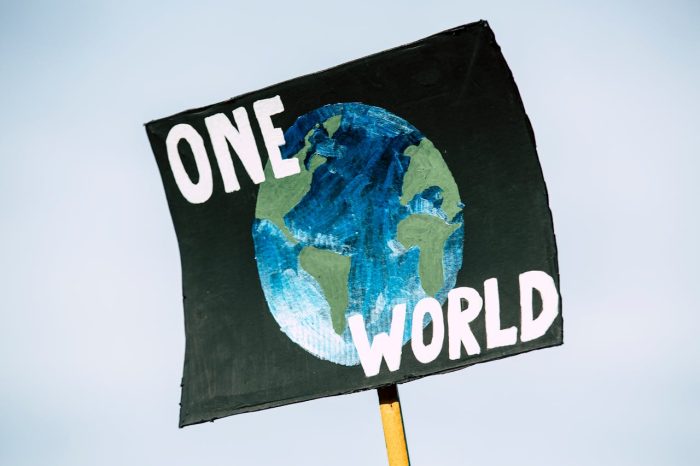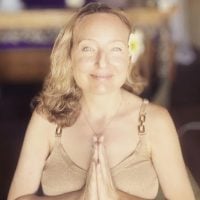*Editor’s note: “Stop covering politics,” some of our dear readers cry every time we post something relephant. Look: politics are life. Equal rights, empathy, fair economy, healthcare. We can’t ignore what’s happening, and you shouldn’t either. Elephant Journal articles represent the personal views of the authors, and can not possibly reflect Elephant Journal as a whole. Disagree with an Op-Ed or opinion? We’re happy to share your experience here.
“The world will not be destroyed by those who do evil, but by those who watch them without doing anything.” ~ Albert Einstein
Collective Care as a Responsibility, Not a Choice
I want to talk about activism—or more specifically, the way we perceive it and why so many people, particularly in spiritual circles, resist identifying with it.
I recently had a conversation with a dear friend who, like me, has been deeply involved in activism for Gaza. We’re both exhausted. We’re both questioning our role—how to show up in a way that still feels meaningful, sustainable, and aligned with our values.
We’ve both lost friends because of our activism. I can say with certainty that I’ve lost clients and social media followers, too. It turns out that speaking out against genocide, injustice, and oppression wasn’t considered “high vibe” enough for the spiritual community.
Maybe the word itself is the problem. It’s heavy; it’s charged; it carries projections of rage, confrontation, exhaustion. It’s easy to say, “I’m not an activist. I’m a healer. I’m here to bring light.”
But what if we’ve misunderstood what activism is?
What if activism is not a role for a select few, but a responsibility we all share?
Because here’s the truth: the world is on fire. And not metaphorically. It is literally burning: through wars, through ecological collapse, through the rise of fascism, through systems that continue to oppress, exploit, and destroy.
Genocide, systemic injustice, ecocide, mass poverty: these are not abstract issues for a handful of people to care about. They are the reality shaping the world we all live in. And to say “this is not my work” is, at best, an illusion of separateness. At worst, it is complicity.
So maybe the word “activism” is the wrong one. Maybe we need to speak instead of collective care. Of responsibility. Of what it means to be part of a world that does not belong to a few, but to all of us. Because whether we accept it or not, we are all in this together.
Privilege and the Illusion of Exemption
I often hear people say, “I’m struggling with my own life. I can’t worry about the world.” And I get it. Many of us are navigating financial insecurity, chronic illness, mental health struggles, family responsibilities. We are exhausted. We are doing our best.
But let me offer a reframe. What if our struggles do not exempt us from engaging with the world, but actually connect us more deeply to it?
Because what is oppression, really? It is systemic. It is interconnected. The same forces that keep so many of us financially struggling are the same forces that allow billionaires to hoard wealth.
The same capitalist structures that extract labour without care for human wellbeing are the ones that extract from the earth, destroying entire ecosystems. The same ideologies that justify genocide and endless war are the ones that uphold patriarchy, white supremacy, and every form of oppression that keeps people in survival mode, unable to thrive.
A book I deeply recommend reading about how all of this is interconnected is “The New Age Of Empire” by Black studies academic Kehinde Andrews, who examines how historical systems of oppression continue to shape contemporary global structures, linking economic exploitation, environmental harm, and social injustices.
So, no, our struggles do not separate us from the global crisis. They link us to it. And the question is not “Do I have time for activism?” The question is “How do I engage with the world in a way that aligns with justice, with healing, with the future I want to see?”
Rethinking Engagement: What does Collective Care look like?
If we move beyond the word activism, we can begin to see that engagement does not have to look one way. It is not just marching in the streets. It is not just fierce protests and policy change. It is also the quieter acts of care, resistance, and truth-telling.
Here are just some of the ways we can be part of the shift:
>> Speaking up in our circles: normalising conversations about injustice, even when it’s uncomfortable. Talking about Palestine, about climate collapse, about rising authoritarianism in places where silence is the default.
>> Economic choices: where we put our money matters. Are we supporting ethical businesses? Are we divesting from corporations that fund war, exploitation, and ecological destruction?
>> Educating ourselves and others: it is a privilege to look away. Those who suffer cannot afford ignorance. Read, listen, share.
>> Mutual aid and direct support: donating to those on the frontlines, supporting communities in crisis, uplifting grassroots movements instead of relying on institutions that will not save us.
>> Disrupting narratives: mainstream media will not always tell the full truth. Find alternative sources. Share them. Do not let silence become complicity.
The point is, there is no single way to engage. Some people are loud. Some work in the background. Some write, some provide shelter, some hold space. Some break cycles within their own lineage so that the next generation is freer.
It all matters.
Why the Fierce are Tired, and Why that should Alarm us
Here’s something else we need to talk about. Activists are tired.
We are exhausted because too few people are carrying the weight of too much. Because while some choose the illusion of neutrality, others are burning themselves out trying to stop the destruction. And when activists are exhausted, when we are too depleted to keep going, that is when injustice wins.
And it is easy to judge us. To say we are too angry. Too fierce. Too loud.
But tell me. How should one respond to genocide? To mass starvation? To the destruction of entire forests? To millions of people displaced, murdered, erased?
If anger is the only reasonable response, why do we judge it?
Perhaps because it forces us to look. To feel. And to act.
We Belong to Each Other:
There is a Buddhist teaching: “We are all walking each other home.”
But how do we walk each other home when so many are being left behind?
The world is not separate from us. It is not somebody else’s problem. It is ours. And while we may not be able to fix everything, that was never the point. The point is to refuse to look away. To stand in the truth of our interconnection. To care, even when it would be easier not to.
So perhaps the question is not, “Am I an activist?”
Perhaps the question is, “How do I live in a way that honours the responsibility of being alive in this moment?”
And that, I believe, is a question worth asking.
~


 Share on bsky
Share on bsky





Read 7 comments and reply